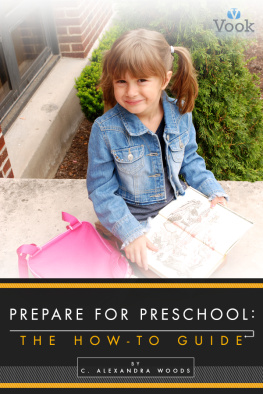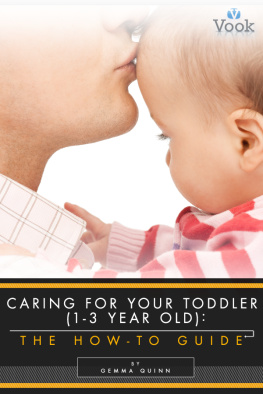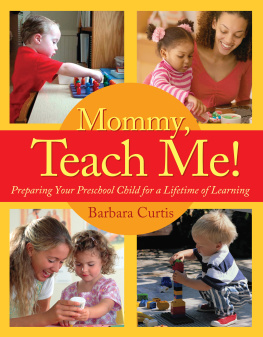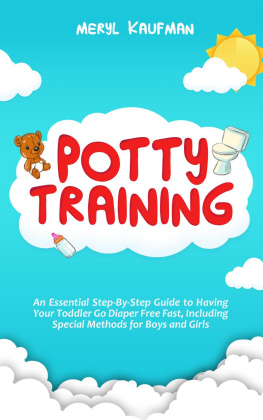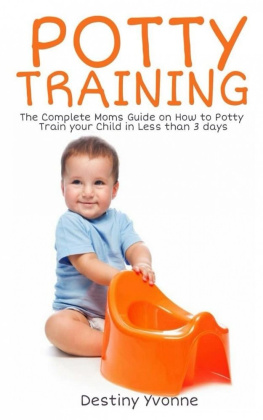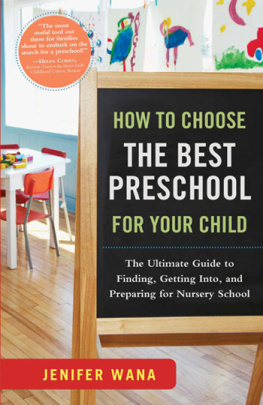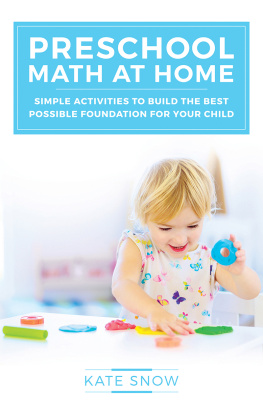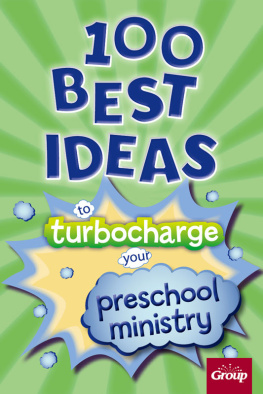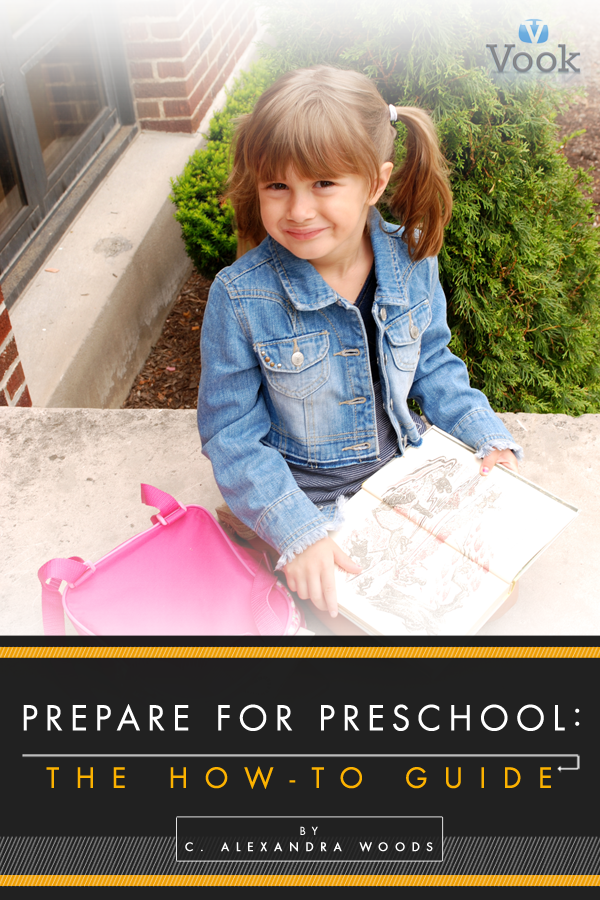In eight easy-to-digest chapters, time-tested methods are dispensed, and youll be led seamlessly through the process of preparing your child to preschool. First, youll learn how to get your son or daughter potty trained and ready to play nicely with other preschoolers. Then youll learn how to mentally prepare your child for this exciting new step, and how to ease any separation anxiety you may experience. Finally, youll learn all about the crucial reading, motor and math skills your child will need at this juncture, and how to ready them for their first day of school. Tips and links throughout provide added dimension and resources to help parents on their journey.
Copyright 2011 Vook, Inc.
Compilation copyright 2011 Vook, Inc.
Vook is a registered trademark of Vook, Inc.
Amanda pulls up to Walnut Creek Preschool in her minivan while her four-year-old son Eric looks nervously out the window. Shes on her phone for a few more moments, discussing details with a partner, while Eric begins chewing on his lower lip. As soon as shes off the phone she hops out of the car and walks to the other side.
Are you ready? She grins, but doesnt wait for him to answer and walks into the preschool with Eric stumbling behind. They find his new preschool teacher waiting outside her classroom in the hallway.
Ms. Paula?
Thats me!
Im Amanda Sullivan, and this is my son Eric. Eric has begun clutching onto Amandas pants this point, his wide eyes looking around nervously.
Hi Eric! Are you ready to come inside and have a fun day? By now, his eyes are watering up. A child runs past him and accidently bumps into him, and thats the breaking point.
Aw. Eric, honey, dont cry. Remember? We talked about this last week. Here. Stop crying, Ill walk with you inside.
Before Ms. Paula can say another word, Amanda is leading her sniffling son into the classroom. She points to some children playing with blocks.
Eric, honey, why dont you go over there and say hi? They look nice. Mommy needs to go to work now.
But then, Eric is crying again. Both hands have pulled Amandas pants into balls, and his knuckles are white. It takes Mrs. Sullivan a good 10 minutes to extract herself from the situation and leave the preschool. Eric cries for another thirty minutes before Ms. Paula is able to calm him down. For the rest of the day he plays with no one.
The next day, when its time to go back to school again, Eric wont get out of bed. Amanda has to fight him even to just get him to put his clothes on. The trip to preschool is a disaster.
E very parent will experience some challenges when taking their child to pre-K for the first time, but there are steps you can take to make the transition as smooth as possible. Whether youre on your first child or your fourth, theres wisdom to be gleaned from these chapters.
Pre-K isnt just about dropping your kid off for that first day. In fact, theres a long but manageable process involved for you and your child to navigate this important transition successfully.
The following chapters cover details such as:
- Potty training for toddler aged children
- Motor, math, and language development
- Socialization with other children
- That first day challenges
- Separation Anxiety
With a little guidance, you and your children will make it through Pre-K unscathed.
Chapter 2
Potty Training
T his may seem like a strange chapter to include, but some children are able to start pre-K as early as three years old. The preschools that take such young children reasonably ask that your child already be well on their way to being potty trained. With upwards of 20 children per class, you cant expect a teacher to have the time to change diapers. Children develop at different rates and as such climb over different developmental hurdles as various ages, its important to be aware of your own childs progress. Potty training can come as early as three, but some children may still have bladder issues as late as five. All of this is perfectly normal and reasonable. The following are little notes to help guide you on the rocky path to the toilet.
How Do I Know My Child is Ready?
- Their diaper stays dry three hours or more.
- They begin using the bathroom at regular intervals.
- They begin to know when their bladder is full.
TIP
Ways to tell when your child needs to go to the bathroom include: Squatting, covering their crotch, or simply just keeping track of how much liquid theyve had for the day.
Some common problems with potty training include:
- Discouragement. Sometimes in our excitement, we think that switching our children over to underwear will help speed up the process. And in some cases, this does. Moving from a diaper to underwear is a big deal for a kid. But in the same token, its upsetting to a child when they dont meet the expectations that underwear brings. If a child has too many accidents in underwear it can stunt the progress that brought them there in the first place
- Relapses. Its perfectly normal for a child to be 95 percent potty trained. What I mean by this is that perhaps once a month, they have an accident after working at this progress for years. Its also easy for child who has only just begun potty training to surge forward and then fall back a bit. With a little patience and encouragement your child will begin to move forward again.
- Battle of Wills. Youre asking a lot of your child with potty training. Theyre learning to recognize signs from their body and how to respond to them at the same time. Getting frustrated with your child or demanding that your child use the toilet at certain times will only cause the two of you to butt heads. Theres nothing more futile than having a show down with a three-year old, and you may ruin much of the progress youve got. Stay calm and all will end well.
CAUTION
A word on psychological readiness: Some children simply dont care that their diaper is dirty or dont want to get on the toilet. If they dont care, you cant make them. Trying to put a child on the toilet long before hes ready can delay potty training for extended periods of time.
Chapter 3
Playing With Other Kids
Take Your Kid Out
A big part of pre-K is that it teaches your child important social skills that will stay with him into junior high, high school, and beyond. By bringing your child to pre-K prepared, you will make their over all experience much easier and pleasant. How to help them socialize? Unless you already have a house full of children, take your kid to where all the action is. Here a few suggestions.
The Park
The park is an obvious one, but dont overlook it as great social experience for your child. The great thing about the park is that hell encounter children outside his normal age-range as well as children who are faster and stronger. The idea is that in some cases they will want to keep up with those big kids. Sometimes, they will succeed and grow from it. Sometimes, they wont succeed, but still grow from it.

